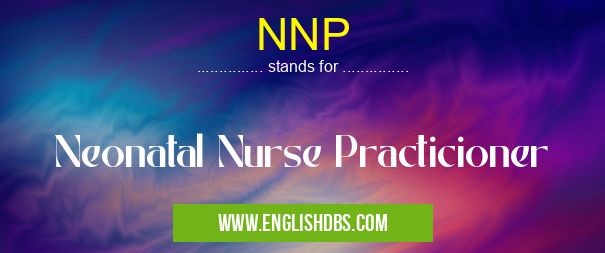What does NNP mean in NURSING
A Neonatal Nurse Practitioner (NNP) is an advanced practice nurse with specialized education and experience in the care of newborn infants. They provide both direct and indirect patient care, as well as perform complex health assessments and medical interventions.

NNP meaning in Nursing in Medical
NNP mostly used in an acronym Nursing in Category Medical that means Neonatal Nurse Practicioner
Shorthand: NNP,
Full Form: Neonatal Nurse Practicioner
For more information of "Neonatal Nurse Practicioner", see the section below.
Essential Questions and Answers on Neonatal Nurse Practicioner in "MEDICAL»NURSING"
What qualifications do NNPs have?
NNPs must complete a graduate-level program which covers evidence-based neonatal medicine, including pharmacology, pathophysiology, nutrition, and health promotion for high-risk infants. Upon completion of their program and a national certification exam, they are certified by the state to provide advanced practice nursing services to neonates.
What type of care do NNPs provide?
NNPs are qualified to perform physical exams on newborns, order laboratory tests and diagnostic imaging studies, diagnose illnesses or conditions, develop treatment plans and administer medications. In addition to providing medical expertise, they offer emotional support to families and help answer any questions or concerns parents may have about their baby's health.
Are NNPs involved in research?
Yes. Neonatal Nurse Practitioners frequently participate in research related to neonatal care and can contribute valuable insight into the development of best practices for infant healthcare. They are also responsible for keeping up to date on the latest developments in their field by continuing their education through workshops, seminars and conferences.
Where do NNPs work?
Yes. Neonatal Nurse Practitioners frequently participate in research related to neonatal care and can contribute valuable insight into the development of best practices for infant healthcare. They are also responsible for keeping up to date on the latest developments in their field by continuing their education through workshops, seminars and conferences.
Where do NNPs work?
Neonatal Nurse Practitioners typically work in hospitals, birthing centers or pediatric practices specializing in newborn care. However, some may choose to open their own private practice or provide consulting services for other health organizations.
What is the job outlook for NNPs?
The need for qualified Neonatal Nurse Practitioners is expected to increase significantly over the next decade due to advancements in technology that allow babies born prematurely or with medical complications to survive longer than ever before. This increased demand will continue long-term due to changing demographics such as an aging population requiring extended medical support beyond infancy stages. Therefore, it is expected that employment opportunities will be plentiful with competitive wages available across all areas of specialty.
Final Words:
Overall, becoming a certified Neonatal Nurse Practitioner can offer a rewarding career path that includes providing compassionate healthcare services while expanding one's knowledge through continuous learning opportunities in an ever-evolving field. With a strong job outlook and competitive wages awaiting skilled practitioners who specialize in newborn care there has never been a better time than now become an NNP!
NNP also stands for: |
|
| All stands for NNP |
